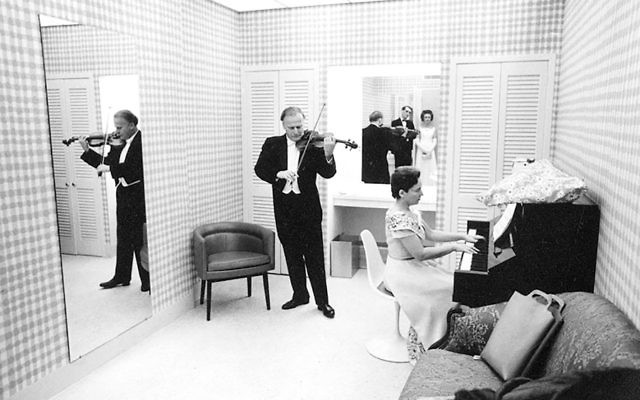Celebrating the life of Menuhin
The centenary of the birth of violin virtuoso Yehudi Menuhin is being celebrated on April 22, with the release of a special book and CDs that celebrate the musician’s amazing life.
VIOLINIST Yehudi Menuhin had just finished a concert at London’s Royal Albert Hall on March 20, 1938, when two avid fans from Melbourne were brought backstage to meet the then 22-year-old virtuoso and his pianist sister, Hephzibah.
They were Nola and Lindsay Nicholas, whose tycoon father, George, was the founder of Aspro. Decades later, Menuhin recalled the impact of the strikingly good-looking, red-haired siblings: “They brought a totally new world with them.”
It proved irresistible. Just two months after that backstage meeting, Yehudi married Nola Nicholas and within weeks, Hephzibah, 18, tied the knot with Lindsay. Not to be outdone, the Menuhins’ 16-year-old sister Yaltah – also a pianist – had just wed Washington lawyer, William Stix, by special licence. Not surprisingly, the hasty marriages ended in divorce.
Like their brother, Hephzibah and Yaltah were musical prodigies, but to parents, Moshe and Marutha – and the world – Yehudi Menuhin, who was born in New York on April 22, 1916, was the undisputed superstar.
Seventeen years since his death in Berlin, his fame remains undimmed and the centenary of his birth is being celebrated in cities across the globe – not least with the release of Warner Classics’ The Menuhin Century, curated by French filmmaker, author and violinist, Bruno Monsaingeon.
Comprising 80 CDs, 11 DVDs and a richly illustrated hardcover book, Passion Menuhin: The Album of a Life, this grand tribute offers both landmark interpretations by the great violinist – to many, the greatest of the 20th century – as well as previously unreleased recordings.
Complementing the music, which spans the years 1929-1998, is Passion Menuhin, written by Monsaingeon and for the first time, available in English and German, as well as French.
The author, who was among Menuhin’s closest friends, makes two things clear. He has invented nothing and the book “contains only words actually spoken by Menuhin”. And he has refrained from delving into subjects “he did not speak to me about in detail”.
Accordingly, there is scant detail about Menuhin’s relationships with his two wives – Nola Nicholas’s successor, British ballerina Diana Gould, proved to be the ideal partner – and four children, but that doesn’t detract from the aptly-titled Passion Menuhin.
For musicologists and music-lovers in general, it is a goldmine of information about the boy wonder whose extraordinary gifts, nurtured by masters including Louis Persinger, George Enescu and Adolf Busch, dazzled throughout his life – the last 15 years devoted to conducting.
At the age of eight, Menuhin, accompanied by the San Francisco Symphony Orchestra, gave his first public concert in front of a 7000-strong audience. By his mid-teens, he was the world’s most highly paid soloist, and press and public alike couldn’t get enough of him.
“Nowadays,” observes Monsaingeon, “we cannot even conceive of a classical musician being ever, before or since, the object of such consummate adulation.”
Behind the sublime artistry, endearing charm and utter lack of affectation that so captivated audiences, was a potent mix of love and discipline inherited from his parents – a blonde, blue-eyed dynamo born Marutha Sher in the Crimea, and Moshe Menuhin (originally Mnuchin), descendant of Chassidic rabbis who had settled in the central Russian village of Gomel .
Both left pogrom-plagued Russia for Palestine as youngsters and then moved to New York where they married in 1915 – Marutha then aged 19 and Moshe, 22.
“If my mother is more Russian than Jewish, my father is indubitably more Jewish than Russian … Absolutely poised, (Marutha) held herself aloof, not one Jewess among many, but a lone descendant of the Tartaric khans,” Yehudi Menuhin noted in his 1977 autobiography, Unfinished Journey.
That aloofness didn’t stop Marutha from blazing with anger, when, just before their son was born, she and Moshe went hunting for an apartment near New York’s Bronx Park and were told by a landlady, “And you’ll be glad to know I don’t take Jews.”
“Back on the street,” Menuhin wrote, “my mother took a vow: her unborn child would wear a label proclaiming his race to the world. He would be called ‘the Jew’.”
His mother’s passion for Eastern exoticism had a powerful effect on the violinist, who in his 30s, discovered the sensory delights of India and its traditional music, especially through his collaborations with sitar master Ravi Shankar.
Also enormously influential were Moshe Menuhin’s convictions about justice and Israel. Like his father, Yehudi, whose first language was Hebrew, believed there could be no lasting peace without a unified Israel shared by Jews and Arabs alike.
During World War II, he had often risked his life by giving concerts to Allied troops in danger zones as well as in London during the Blitz. In July 1945, Menuhin, accompanied by Benjamin Britten, played for Holocaust survivors at Belsen and in 1947, gave several recitals in Berlin.
With peace came one of Menuhin’s greatest challenges: the furore that erupted when he vigorously defended German conductor and composer Wilhelm Furtwangler who had continued to direct the Berlin Philharmonic during the war, but was passionately opposed to the Nazis.
Furtwangler was exonerated by the Denazification Council in 1946, but Menuhin’s role in the affair was still reverberating in 1948 when he prepared to visit the new State of Israel. “We will kill you if you set foot in this country,” warned Menachem Begin. Fortunately, the threat was never carried out.
REPORT by Zelda Cawthorne


comments